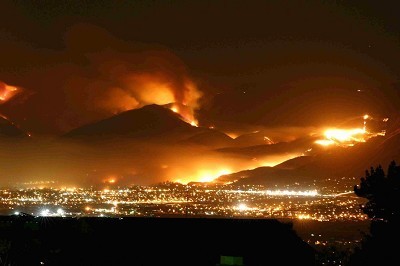
Reprinted from Meridian Magazine (9 Dec 2003)
©2003 by John P. Pratt. All rights Reserved.
| 1. Ancient Experiments |
| 1.1 Jonah and the Tempest |
| 1.2 A Philistine Experiment |
| 2. Modern Experiments |
| 2.1 Statistical Correlation |
| 2.2 Prayer |
| 2.3 Repentance |
| 2.4 Non-Repentance |
| 3. Conclusion |
Is there a correlation between so-called "natural disasters" and breaking the commandments of God? Sometimes both events are found side-by-side on the front page of the newspaper. For example, on June 7, 1998, some Florida newspapers reported the beginning of a huge wild fire in that state and also applauded the successful Gay Day celebration at Disney World, both having occurred on the previous day.
 |
It struck me that he might be absolutely right in his first statement. It may never have occurred to most ancient people that the weather and indeed all of nature was not the work of a Creator. It would be tough for Satan to get his doctrine of atheism accepted by people who actually live close to nature and can easily see the hand of God in all things. The most he could hope for is to get people to believe in other gods, such as the Greek pantheon, or man-made idols. But the suggestion that there might be no higher intelligence at all would have been so ridiculous that no one would have taken it seriously. Fortunately for Satan, he has had a few centuries lately where he could promote more "enlightened thinking" and he could lay enough "scientific" foundation that the notion of atheism is no longer patently absurd, but indeed has been accepted by so many as true. Now what is scary is that if the Lord were to speak through nature, the world at large might not get the message. That could be disastrous.
Let us now turn to historical examples of how people used to actually perform experiments to determine whether or not the Lord's hand was in nature, rather than simply to assume otherwise. Perhaps we can learn something from them.
 |
Then "the Lord sent out a great wind into the sea, and there was a mighty tempest in the sea, so that the ship was like to be broken" (Jonah 1:4). Now let's think about what we would do today, if a ship found itself in a storm at sea. What would the captain do? What would he think caused it? How would it be reported on the evening news?
Well, the first thing that occurred to the captain was that everyone should pray for help. It didn't matter what his religion was, each could pray to whatever idol or god he wanted, but clearly it was a situation which called for prayer (Jonah 1:5). Jonah apparently suspected that his prayer might be ignored, and in fact, he didn't want to pray at all because he was fleeing from the presence of the Lord (Jonah 1:3). When the captain discovered that someone was not praying, he confronted Jonah and demanded that he pray for help (Jonah 1:6). That sounds like a different world from today, doesn't it!
When prayers didn't calm the storm, as apparently expected, the plot thickened. The next obvious step was to determine exactly which person on board was sinning and causing the whole problem. They chose a method that was apparently acceptable to those of every religion: casting lots. How would that be seen in today's society? What if you saw on the news the governor of California rolling dice to determine who was sinning and causing the recent fire devastation? Anyway, the method worked admirably because the lot fell to Jonah, who indeed was the culprit. He confessed, and suggested that it might be best to throw him overboard. That sounded harsh, but being unable to get him to shore, they tried the experiment. That is, they threw him overboard to see if it would calm the sea. Sure enough, it worked! The sea was calmed (Jonah 1:15) and everyone was satisfied that the true cause of the storm had been found. That would definitely make a headline story today if, after drawing straws, someone were thrown off an airplane to see whether or not doing that might calm a storm.
My point here is not just about how different their world was from ours. It is rather that they actually did an experiment to determine whether or not there might have been a link between what appeared to be purely "natural forces" and sinning. Centuries later, Laman was at length induced to perform a similar experiment and untie his brother Nephi from the ship's mast to see if that might calm a similar storm. That experiment was also successful (1 Nephi 18:21).
Now let us turn to my favorite experiment to determine whether God's hand was behind a plague.
The Philistines placed the ark by their god Dagon, but they found that their god fell on his face, and later was decapitated (1 Samuel 5:2-4). Then they were smitten with a plague of hemorrhoids. Now, it might have been easy for them to conclude that Dagon's demise resulted from the Israelite god, but what about the hemorrhoids? What were the chances that they had anything to do with the ark of the covenant? If a hemorrhoid epidemic broke out today, what would you think was the cause? How could they possibly know if there was any connection at all between the ark and this new plague?
Please think about that for a moment. The case of Jonah led to a quick and simple experiment to determine the source of the problem. But how could the Philistines know? If they simply returned the ark and the hemorrhoids stopped, that would be nice, but far from a conclusive experiment. Maybe the plague would have stopped anyway, and they would have lost a treasure for nothing.
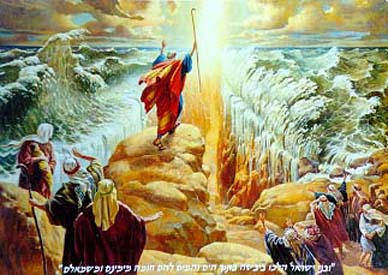 |
Okay, back to the Philistines. What could they do to know with some degree of certainty that the Israelite god was at the bottom of their pain? Unlike Pharaoh, they didn't have a Moses to explain to them the source of their distress. They decided to try some experiments.
First, they moved the ark to a different city to see what effect that might have. Sure enough, the hemorrhoid plague seemed to follow it. Then they tried yet another city and the same thing happened. Statistics were beginning to build in favor of some sort of connection. Soon the suggestion arose to send it back to their enemies, whence it came.
Then their wise men proposed a clever experiment. We might do well to consider it carefully. They chose two cows which were currently nursing calves, and which had never pulled a wagon. They put the ark in a wagon, along with an offering to the Israelite god, and hitched up the two cows to it. They put them at a crossroads with the wagon, after having taken their calves away from them. The experimental test was simple. Nature would dictate that the cows would very probably go directly to their calves. If not, then chance would suggest that they might pull the wagon in some random direction. If either of those events resulted, they would conclude that the Israel god had nothing at all to do with the hemorrhoid outbreak. On the other hand, in the very unlikely event that the cows pulled the wagon directly back to Israel, then they would have strong evidence that God's hand was in it. Here is the exact quote outlining these two expected experimental results:
And see, if it [the cart] goeth up by the way of his own coast to Bethshemesh, then he [the god of Israel] hath done us this great evil: but if not, then we shall know that it is not his hand that smote us: it was a chance that happened to us. (1 Samuel 6:9)
There you have it: a somewhat scientific experiment, with precise meaning attached to the results. What do you think? Would that be convincing?
Well, it turns out the cows took the ark straight back to Israel. The Philistine lords followed it to see what would happen, and reported that the cart turned neither to the right nor the left but went straight to where the Levites discovered it (1 Samuel 6:12-16). So they were convinced. Though we are not explicitly told, it is assumed that the plague stopped shortly thereafter.
Before proceeding with some possible experiments to attempt to answer that question, let us note what the Lord himself has told us. He has stated that the time will come after the preaching of his elders, that he will preach is own sermons with so-called natural disasters:
For after your testimony cometh the testimony of earthquakes, that shall cause groanings in the midst of her, and men shall fall upon the ground and shall not be able to stand.
And also cometh the testimony of the voice of thunderings, and the voice of lightnings, and the voice of tempests, and the voice of the waves of the sea heaving themselves beyond their bounds. (D&C 88:89-90)
Behold, vengeance cometh speedily upon the inhabitants of the earth, a day of wrath, a day of burning, a day of desolation, of weeping, of mourning, and of lamentation; and as a whirlwind it shall come upon all the face of the earth, saith the Lord. (D&C 112:24)
Behold, now it is called today until the coming of the Son of Man, and verily it is a day of sacrifice, and a day for the tithing of my people; for he that is tithed shall not be burned at his coming.
For after today cometh the burning--this is speaking after the manner of the Lord- for verily I say, tomorrow all the proud and they that do wickedly shall be as stubble; and I will burn them up, for I am the Lord of Hosts; and I will not spare any that remain in Babylon. (D&C 64:23-24)
Thus, in case there was any doubt in our minds, the Lord makes it clear that he not only can sometimes speak through natural forces, but he expects us to understand his message and to repent. Let us now consider some modern day experiments to determine whether or not God speaks through natural disasters.
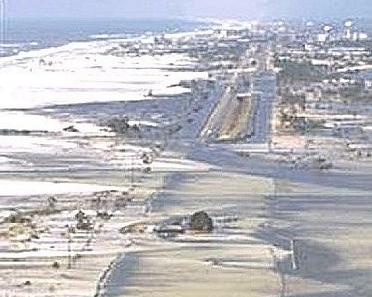 |
For example, on Oct. 17, 1989, a magnitude 7.1 earthquake hit San Francisco during a Pro Abortion Rally. Of course, it was also during a myriad of other events, so maybe there was no connection. On June 28, 1992, southern California experienced a very strong earthquake on "Gay Pride Day." Are those just chance coincidences? They might be, that is why a detailed study is needed of many such events. Sometimes, however, there is an unlikely twist included which makes a connection seem more likely.
One such example was Hurricane Opal (1995). It had been classified as a mere category 2 hurricane, which the residents of Florida could easily prepare for. On Oct. 2, 1995 there was a pro-abortion ruling from the Supreme Court. Suddenly, and without any advance warning, the storm increased overnight into a devastating category 5 hurricane. Moreover, it made a sharp turn and headed straight for Florida. One article described this as the worst possible scenario: that residents go to bed after preparing for a small storm only to be awakened by a huge one. It is difficult to scientifically evaluate something like a storm changing direction and intensifying unexpectedly right at the time of a Supreme court decision. If a study were done, it would need to consider both how unlikely the natural event was and also how closely timed with the public event.
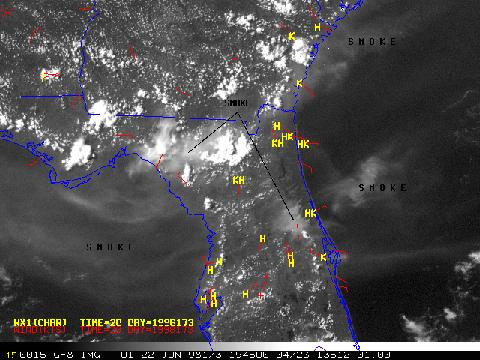 |
A classic example of this experiment from ancient history is the rest of the story of Jonah. He finally did reconsider, preached repentance in Nineveh, and to his complete surprise the city repented in sack cloth and ashes, and was saved.
But this happy ending would not impress the scientist, because the net effect was that nothing happened. That is, fire did not come out of the sky and consume the city. That is hardly a news story for the non-believer.
In preparing this article, I had trouble finding modern headlines about Mayors or Governors asking their people to repent and to begin to obey the laws of God. It just doesn't seem to be politically correct any more. So instead, consider a well-known case from LDS Church history.
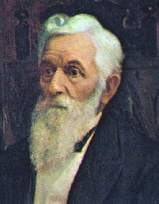 |
In fact, that experiment is explicitly recommended in the scriptures. The Lord has challenged us to try paying tithing as an experiment: "Prove me now herewith, saith the Lord of hosts, if I will not open you the windows of heaven, and pour out a blessing, that there will not be room enough to receive it." He even adds a very scientifically verifiable prediction: "neither shall your vine cast her fruit before the time" (Mal. 3:10-11).
Again, it is tough to prove scientifically that the rain was related to the tithing, but it would be possible to show a correlation with a large number of similar cases. But when the Lord tells us through his prophet that there is indeed a correlation, the need for the scientific proof dwindles in the eyes of believers. The Lord is gracious enough to condescend to simply tell us the answer to the study in advance, so we can benefit from his omniscient perspective.
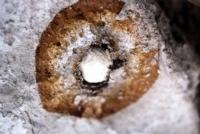 |
In any case, it is not recommended to try this experiment. The repentance and obedience option is far superior even though the results may be less spectacular. In fact, the Savior himself challenged us to use a scientific method. He promised that if we actually try keeping his commandments we will know for ourselves that they are from God (John 7:17). That's a very scientific approach, and it sure sounds like it's worth a try.
Perhaps the truth lies somewhere between two extremes. On the one hand, some cultures have believed that nearly every natural occurrence is the purposeful work of God, and that if something "bad" happened, then it must have been caused by sin. Job's friends accused him of sinning when he came upon hard times, and actually he was just being tested. On the other extreme, the modern point of view tends to be that there is no purpose at all in life, or in natural occurrences, and that it is just random chance that governs the universe. Reality might lie between these extremes, where at least sometimes natural disasters do result from either God punishing us for sin, or at least withholding blessings because we have failed to obey his laws. And that could be on both the large scale and also small scale of personal disasters. Some calamities might be consequences of sin, perhaps some are part of a test or learning exercise, and perhaps some are really caused by chance. Hopefully this article will encourage us all to at least consider these possibilities as we look both at events in the news as well as in our personal lives.